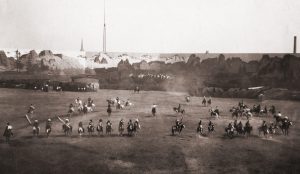Some Gave All: Forgotten Old West Lawmen Who Died With Their Boots On, by J.R. Sanders, Moonlight Mesa Associates, Wickenburg, Ariz., 2013, $19.95
The American West has added a healthy helping of new mythology to that of other eras, much of it personifying the struggle between good and evil in the form of two men or more squaring off in a dusty street to determine whether law and order will prevail. Bad guys get their just desserts, good guys die martyrs’ deaths; a lucky handful of both are remembered by posterity and have their exploits replayed, usually in distorted form, on the large or small screen.
In Some Gave All J.R. Sanders focuses on lawmen who also fell martyr to their sense of civic duty but who never obtained national fame. Delving into the still-available newspapers and documentation of the times, he presents the lives and violent times of 10 peace officers and the equally diverse rogues gallery of lawbreakers who cut these lawmen’s careers short between 1879 and 1910. As Wild West Editor Gregory Lalire writes in the foreword, Sanders “tells these stories with flair, bringing out the drama in the lives and deaths of some of the countless Western lawmen worth knowing.”
Such is the comprehensive nature of Sanders’ storytelling that several chapters call to mind a Wild West version of the contemporary television show Law and Order. After the background and buildup leading to the crime, he pursues the aftermath—which, if the killer is taken alive, transfers the action into the courtroom, where one must read on to learn his ultimate fate—whether dangling at the end of a rope, getting away with murder or somewhere between these two extremes.
The lawmen profiled in this book were courageous but only human, each having to make decisions that didn’t always pan out. In 1885 U.S. Marshal Harrington Lee “Hal” Gosling let his sense of decency get the better of prudence when he accompanied convicted train robbers James B. Pitts and Charlie Yeager on their way from Austin, Texas, to the San Antonio Jail with some of their female relatives in tow—a decision that cost him his life and those of two others. More tragic was what occurred on July 19, 1898, when the law trapped a violently disturbed explosives worker named Quong Ng Chong in the powder magazine of the Western Fuse and Explosives Co., just outside of Oakland, and tried to talk him out. The outcome was felt beyond San Francisco, and the body count included four deputy sheriffs and a constable, still the greatest single loss of law enforcement lives in California history.
Sanders’ stories may not always have the neat symmetry of one’s favorite traditional Western, but they do illustrate the violent psyches that pervaded the West even as it was transitioning into the 20th century. The names here may not be as familiar or catchy as Wyatt Earp, Wild Bill Hickok or Bat Masterson, among the biggest names in Western mythology. But the true grit displayed by the protagonists in Some Gave All should provide enough real-life drama to interest any aficionado and prove that truth played straight can hold up alongside any fiction
Jon Guttman




